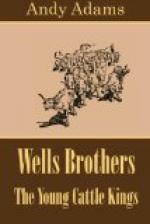“Yes, unless you can cure a fool from lending his pistol,” replied Forrest.
“Certainly. I’ve noticed that similarity in all gunshot wounds: they usually offer good excuses. It’s healing in its nature,” commented the doctor, as he began removing the bandages. As the examination proceeded, there was a running comment maintained, bordering on the humorous.
“If there’s no extra charge,” said Forrest, “I wish you would allow the boys to see the wounds. You might also deliver a short lecture on the danger of carrying the hammer of a pistol on a loaded cartridge. The boys are young and may take the lesson seriously, but you’re wasting good breath on me. Call the boys—I’m an old dog.”
“Gunshot wounds are the only crop in this country,” continued the doctor, ignoring the request, “not affected by the drouth. There’s an occasional outbreak of Texas fever among cattle, but that’s not in my department. Well, that bullet surely was hungry for muscle, but fortunately it had a distaste for bone. This is just a simple case of treatment and avoiding complications. Six weeks to two months and you can buckle on your six-shooter again. Hereafter, better wear it on the other side, and if another accident occurs, it’ll give you a hitch in each leg and level you up.”
“But there may be no fool loafing around to borrow it,” protested Forrest.
“Never fear, son; the fool’s eternal,” replied the doctor, with a quiet wink at the others.
The presence and unconcern of the old physician dispelled all uneasiness, and the night passed without anxiety, save between the boys. Forrest’s lecture to Dell during the day, of the importance of making friends with the drovers, the value of the water, the purchase of disabled cattle, was all carefully reviewed after the boys were snugly in bed. “Were you afraid of the men with the herd to-day?—afraid of the cowboys?” inquired Dell, when the former subject was exhausted.
“Why, no,” replied Joel rather scornfully, from the security of his bunk; “who would be afraid? They are just like any other folks.”
Dell was skeptical. “Not like the pictures of cowboys?—not shooting and galloping their horses?”
“Why, you silly boy,” said Joel, with contempt; “there wasn’t a shot fired, their horses were never out of a walk, never wet a hair, and they changed to fresh ones at noon. The only difference I could see, they wore their hats at dinner. And they were surely cowboys, because they had over three thousand big beeves, and had come all the way from Texas.”
“I wish I could have gone,” was Dell’s only comment.
“Oh, it was a great sight,” continued the privileged one. “The column of cattle was a mile long, the trail twice as wide as a city street, and the cattle seemed to walk in loose marching order, of their own accord. Not a man carried a whip; no one even shouted; no one as much as looked at the cattle; the men rode away off yonder. The herd seemed so easy to handle.”




